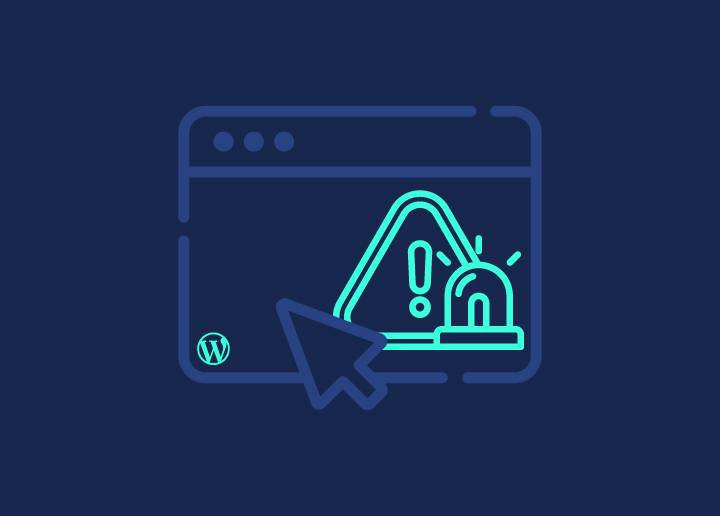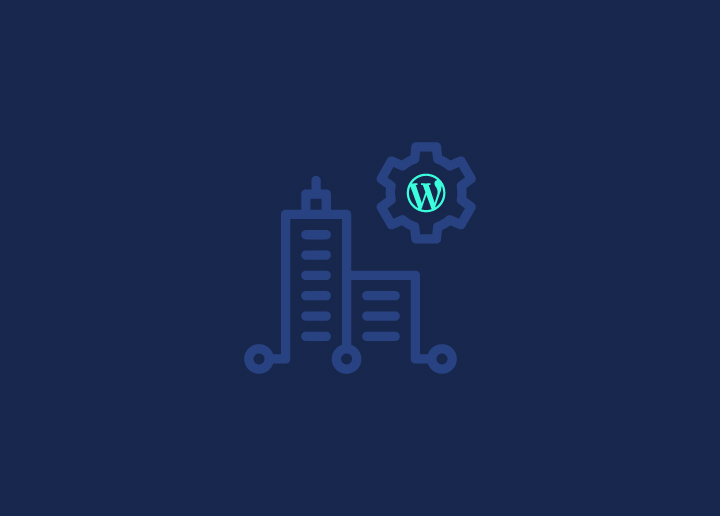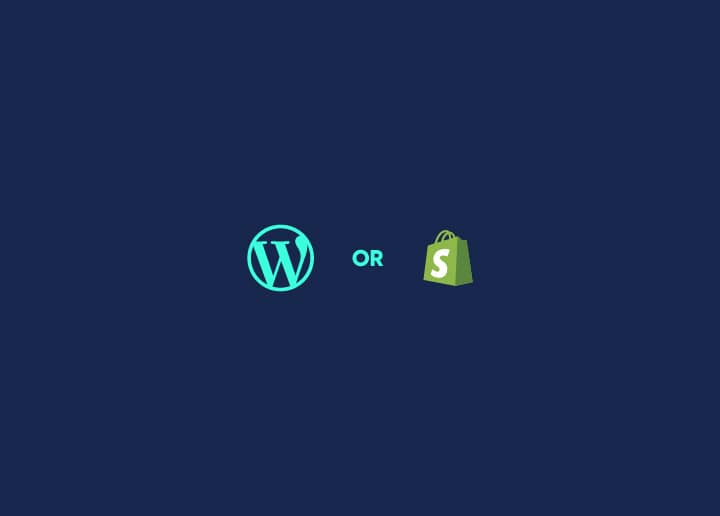Choosing the right eCommerce platform is a make-or-break decision for your online business. Enter two titans in the eCommerce arena – Shopify or WordPress with WooCommerce – which one should you choose to fuel your eCommerce dreams?
Shopify is the ultimate plug-and-play solution, offering a user-friendly interface and seamless integration, perfect for eCommerce newbies. WooCommerce, on the other hand, is the open-source powerhouse that transforms your WordPress website into a fully-fledged online store, giving you unparalleled customization options – but at the cost of a steeper learning curve. However, dedicated WordPress support for improvement of eCommerce sites any day gets easier with outsourced maintenance teams available at incredibly efficient costs!
Read on to make an informed decision!
Contents
ToggleShopify & WordPress for eCommerce: How Do They Stack Up?
Shopify is a proprietary software-as-a-service (SaaS) e-commerce platform that enables businesses to set up an online store and sell products. It offers a suite of services including website and blog hosting, online store management, inventory tracking, payment processing, shipping, and marketing tools. A key advantage of Shopify is its all-in-one nature – it provides everything a merchant needs to launch and run an e-commerce business without piecing together multiple tools. Shopify also offers point-of-sale capabilities to bridge online and physical retail sales.
WordPress, on the oher hand, is not an e-commerce platform out-of-the-box. But it can be transformed into a full-featured online store with the addition of the WooCommerce plugin and various extensions. Then it provides limitless customization options through themes and plugins, seamlessly blending content marketing with online sales. While requiring more setup, WordPress eCommerce offers unmatched versatility and scalability ideal for merchants prioritizing creative control over turnkey solutions.
When comparing the two, it is evident that Shopify provides some upfront, all-inclusive conveniences. But WordPress’ model is better tailored for controlled growth – giving ample feature-depth, generous flexible limits, and an extensible, cost-effective roadmap for future expansion.
Let’s take a closer look:
- Unlimited Products: While Shopify offers unlimited storage, most businesses don’t require truly unlimited capacity. WordPress’ 50GB limit is ample for the majority of online stores, especially given its strength in content marketing integration – allowing you to host videos, guides and more alongside products within that storage.
- Storage: Shopify’s unlimited storage comes with a 20MB file size restriction, which can be limiting for media-rich product listings. WordPress’ maximum 200GB capacity through paid add-ons allows for larger files while still providing sufficient space for most stores. Its pay-as-you-grow model is cost-effective.
- Integrations: Although Shopify runs over 8,000 apps. Many are niche or unnecessary for e-commerce. WordPress’ access to 60,000 plugins alongside 820 dedicated WooCommerce extensions covers all core functions, with better free options. Its open ecosystem encourages more innovation.
- Customer Support: While both lack phone support, WordPress’ tiered model lets businesses start small and upgrade support channels with plugins like LiveChat as they grow. This aligns nicely with its pay-as-you-scale approach, ensuring you only pay for the support you need when you need it.
Read More: How To Execute Content Marketing With Link Building?
Shopify or WordPress as eCommerce Companion? Point-by-Point Comparison
Weigh Shopify or WordPress – who will be your long-standing eCommerce companion? We will dissect their strengths and features point by point:
Platform Design and UX
Shopify provides a more streamlined, intuitive experience for setting up and managing an online store from the get-go, with pre-designed themes optimized for e-commerce.
WordPress offers unparalleled design flexibility and customization capabilities, but requires more technical effort to build a tailored shopping experience.
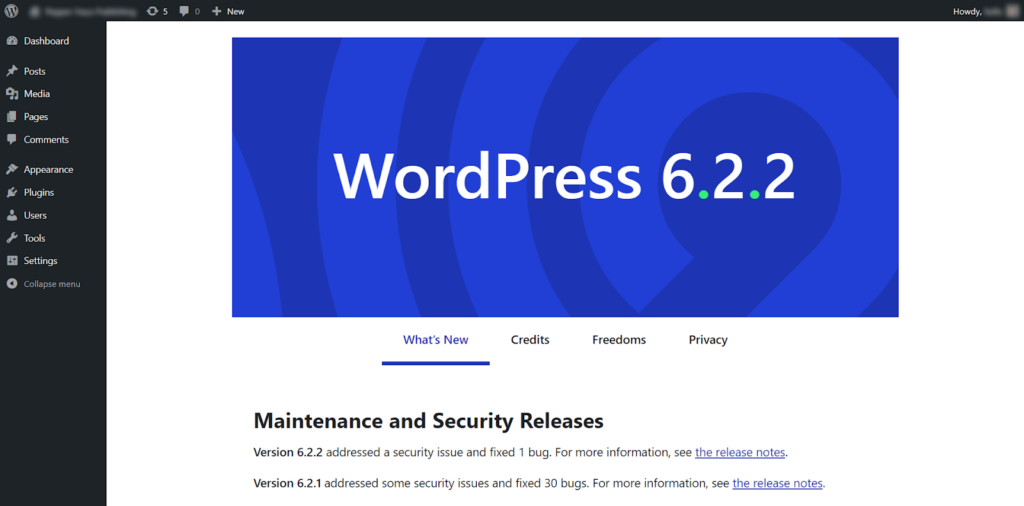
Key Takeaways:
- Shopify’s interface and setup process are geared specifically for e-commerce stores.
- WordPress’ core interface is geared towards general websites, requiring e-commerce plugins.
- Shopify themes come pre-built with essential e-commerce UX elements like product pages, carts, checkout.
- WordPress themes need separate plugins integrated to add e-commerce functionality.
- Customizing themes on Shopify can be done through their theme editor with some code editing.
- WordPress allows for essentially unlimited design freedom through themes, plugins and code.
- Shopify simplifies the process of getting an online store launched quickly.
- WordPress has a steeper learning curve but maximizes potential for a unique, tailored UX.
Also Check: List Of Free WooCommerce Themes
Winner: WordPress.
WordPress provides creative merchants with the tools and flexibility to craft a truly distinctive, customized online store experience aligned with their brand vision – albeit with more technical investment required. Building sites with WordPress is easy when you have a confident WordPress development team doing the legwork for you.
Ready to Build an e-Commerce Site to Leave a Lasting Impression on Your Visitors?
We have you covered with our creative custom design plans to transform your ideas into stunning results for your website traction.
Web Hosting
Shopify is a fully-hosted e-commerce platform, meaning they take care of all website hosting and server management for you.
In contrast, WordPress is self-hosted, requiring you to purchase web hosting from a third-party provider separately. Here are a few third-party hosting options to check out –
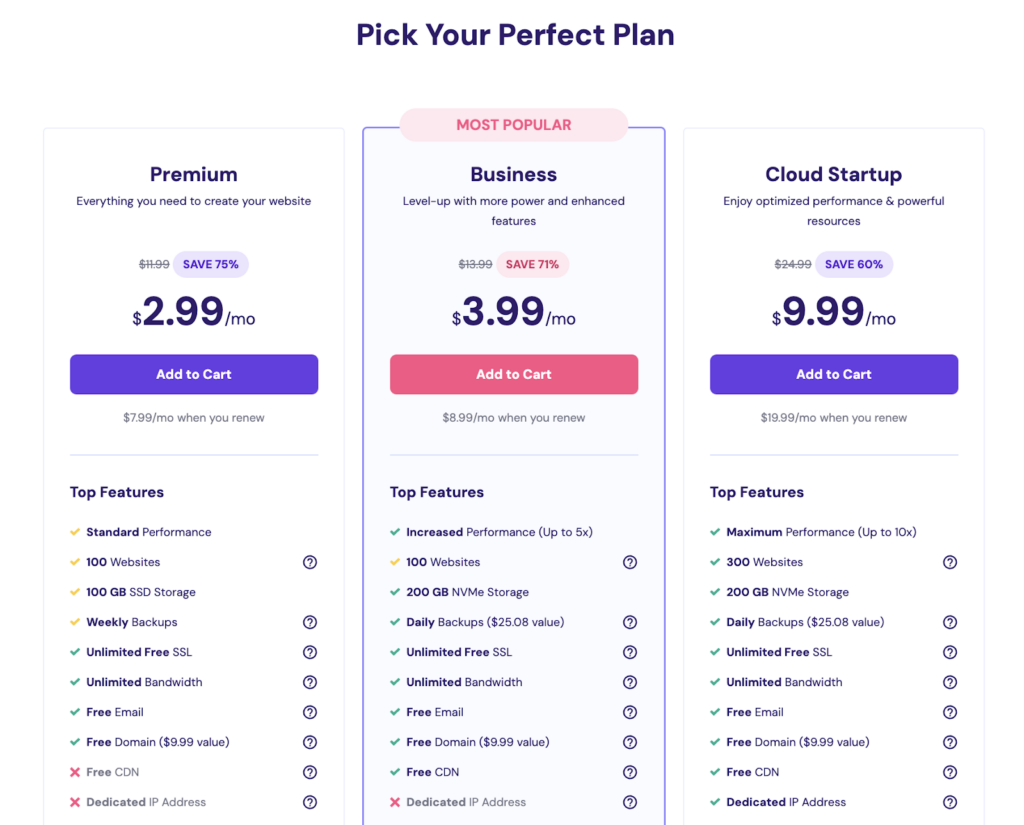
Web Hosing Plans, by Hostinger.
Key Takeaways:
- Shopify’s all-inclusive hosting eliminates the need to manage servers or purchase separate hosting, making it a turnkey solution.
- With WordPress, you have the responsibility of finding and paying for your own web hosting provider and plan.
- Shopify provides less control over server configurations and access to debug issues compared to self-hosted WordPress.
- WordPress offers more flexibility to choose hosting specs tailored to your needs and control over the server environment.
- The convenience of Shopify’s hosting is balanced by less server-level customization; WordPress involves more setup but grants more technical control.
- Hosting costs are built into Shopify’s pricing, while WordPress requires factoring in a separate hosting expense.
- Scalability on Shopify is simplified but constrained by their hosting; WordPress hosting can scale as needed through upgraded plans.
Check More: Top Free WordPress Hosting Providers in the USA
Winner: WordPress.
Because the trade-off is exchanging Shopify’s convenience of bundled hosting for the ability to fully customize and scale your web hosting environment as your needs evolve.
Storefront Design
With Shopify themes, your storefront is almost instantly set up upon installation. Simply customize the text and branding to align with your business, and you could have your online shop ready within hours.
Similarly, WordPress offers a vast library of free themes, including thousands tailored for e-commerce. Just filter by “E-Commerce” to explore options designed specifically for online stores.
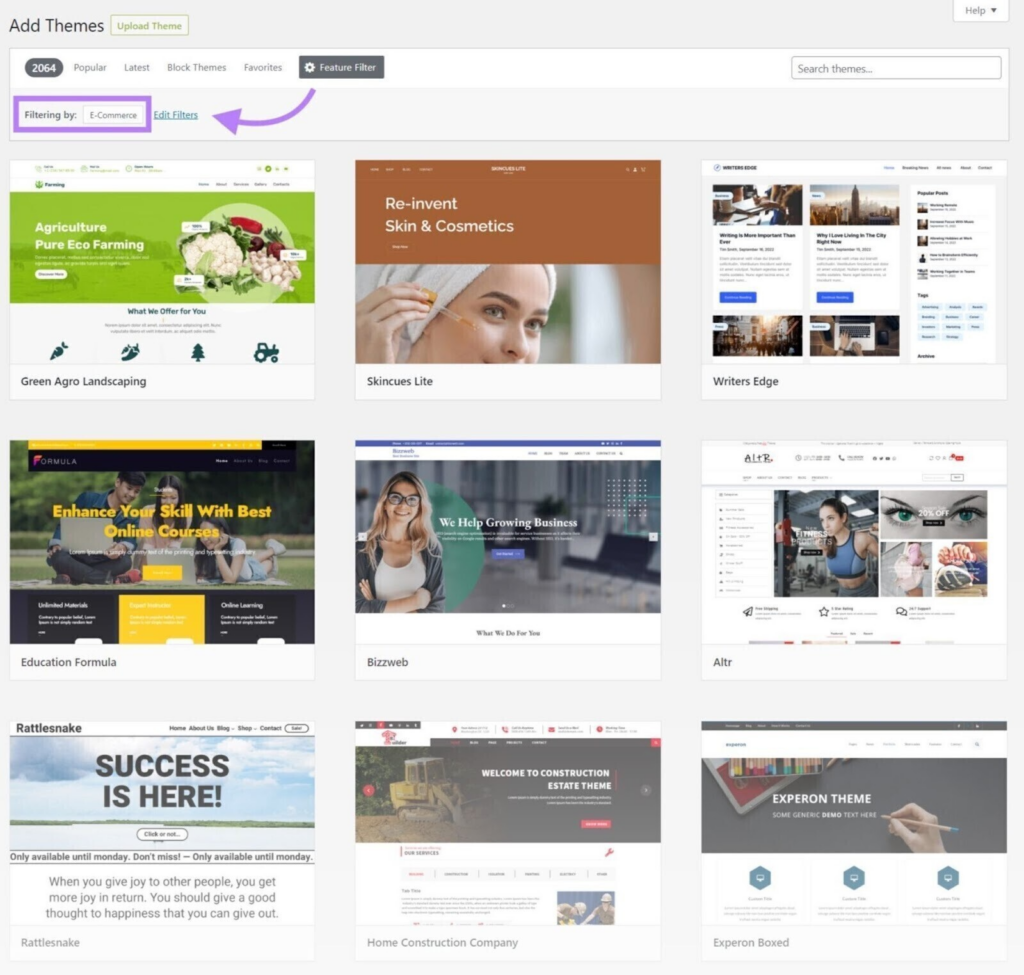
Shopify provides a vast selection of professional, pre-designed themes optimized for e-commerce.
WordPress offers highly customizable themes but often requires additional plugins or coding to fully build an online store experience.
Key Takeaways:
- Shopify’s themes are eCommerce-ready with built-in product pages, carts, checkout, etc.
- WordPress themes require integrating separate e-commerce plugins like WooCommerce.
- Shopify has over 70 premium and free theme options to choose from.
- WordPress offers over 8,000 free themes, plus premium options for more designs.
- Customizing Shopify themes requires some code editing; WordPress allows deeper customization.
- Shopify includes a theme editor; WordPress customization happens via themes/plugins.
- Page builders like Divi can streamline WordPress store design without coding.
- Shopify provides a faster setup; WordPress allows more design versatility.
Winner: WordPress.
While Shopify makes it faster to get an attractive, functioning online store launched, WordPress grants essentially unlimited design flexibility when combined with the right e-commerce plugin and supporting tools. The trade-off is ease of setup vs. extent of customization.
Keep Reading: Guide to Creating Your Website Design RFP
Ecommerce Functionality
When comparing eCommerce functions, Shopify and WordPress offer diverse capabilities tailored to different user needs. Both platforms enable users to sell physical and digital products, customize shipping rates, manage product variations, and schedule discounts.
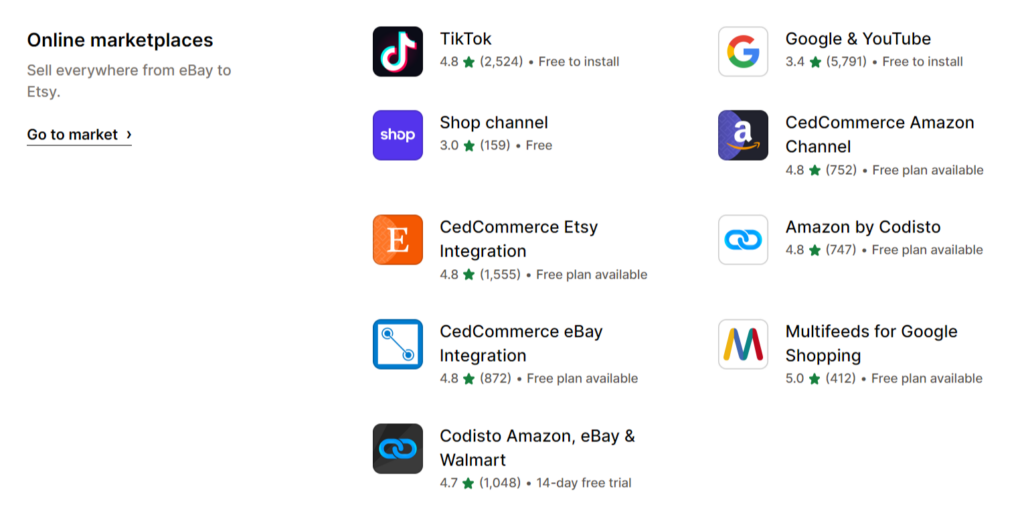
Key Takeaways:
- Shopify specializes in eCommerce and provides a comprehensive set of features for starting and scaling online stores. The Shopify App Store offers categorized apps for easy navigation and integration with various eCommerce functionalities.
- WordPress offers over 1,000 plugins specifically for eCommerce, allowing users to customize their online stores according to their unique requirements. While the plugin library provides flexibility, finding suitable plugins may require browsing through multiple options compared to Shopify’s categorized App Store.
- Both platforms support multi-channel commerce, enabling users to sell products on online marketplaces, brick-and-mortar stores, pop-up shops, and social media platforms. However, Shopify offers more intuitive integration with platforms like Facebook, Instagram, and Handshake, along with easy access to additional apps for selling on TikTok, Etsy, Amazon, eBay, and Walmart.
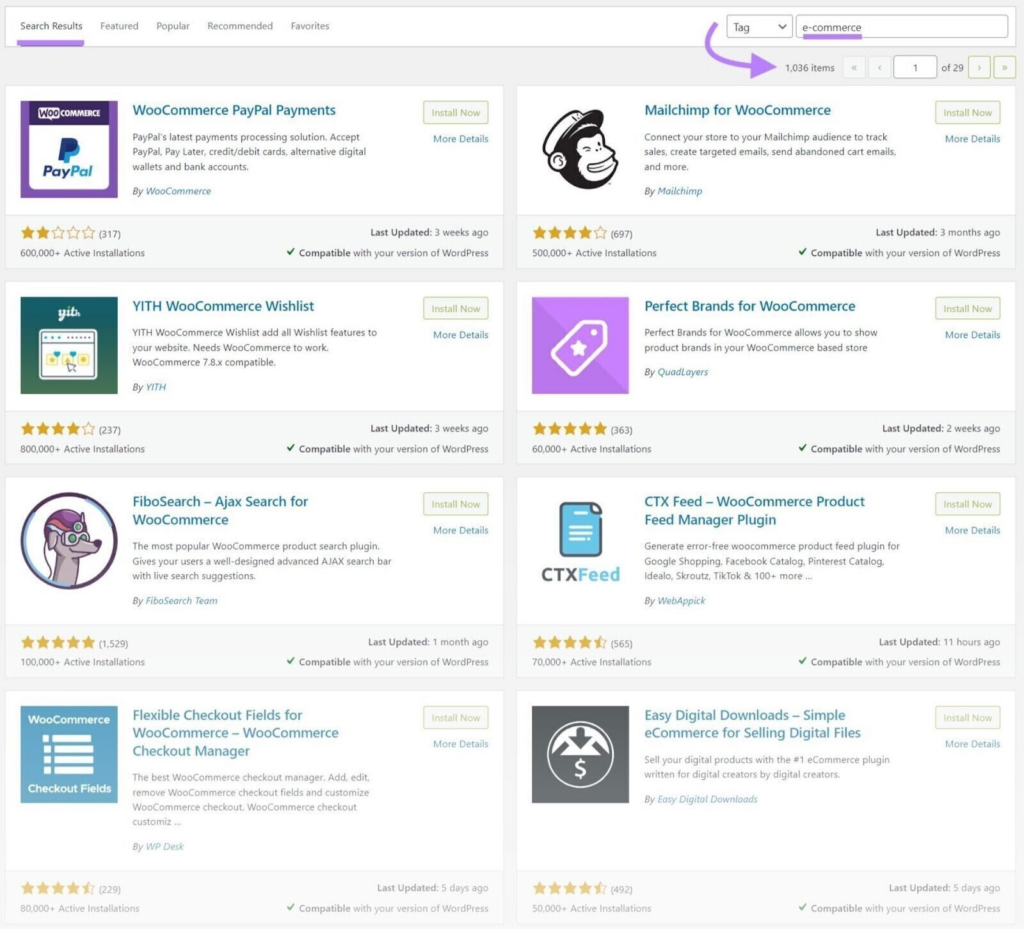
- Shopify simplifies multi-channel commerce setup by connecting to various platforms seamlessly, including social media and wholesale marketplaces, along with POS system integration for in-person sales. WordPress can also connect to different channels like eBay, Amazon, and Google, but setting up multi-channel commerce may require additional plugins.
- WordPress’s vast plugin library offers flexibility and often provides free options and customer retention plugins like WordPress helpdesk plugins. However, setting up multi-channel commerce on WordPress may not be as straightforward as it is with Shopify due to the need for additional plugins and integrations.
Further Reading: Top WooCommerce Sales Funnel Plugins to Skyrocket Your Conversions
Winner: WordPress – because WordPress connects with various eCommerce channels and is available to work splendidly well with a vast number of plugins.
SEO
Both Shopify and WordPress provide features and tools to optimize websites for search engines. However, optimizing WordPress’ WooCommerce SEO is now easier than ever, thanks to the variety of WordPress plugins and extensions available to cater to your specific requirements. Choose the plugin or extension that best suits your needs, knowing they receive regular updates for enhanced security and efficiency.
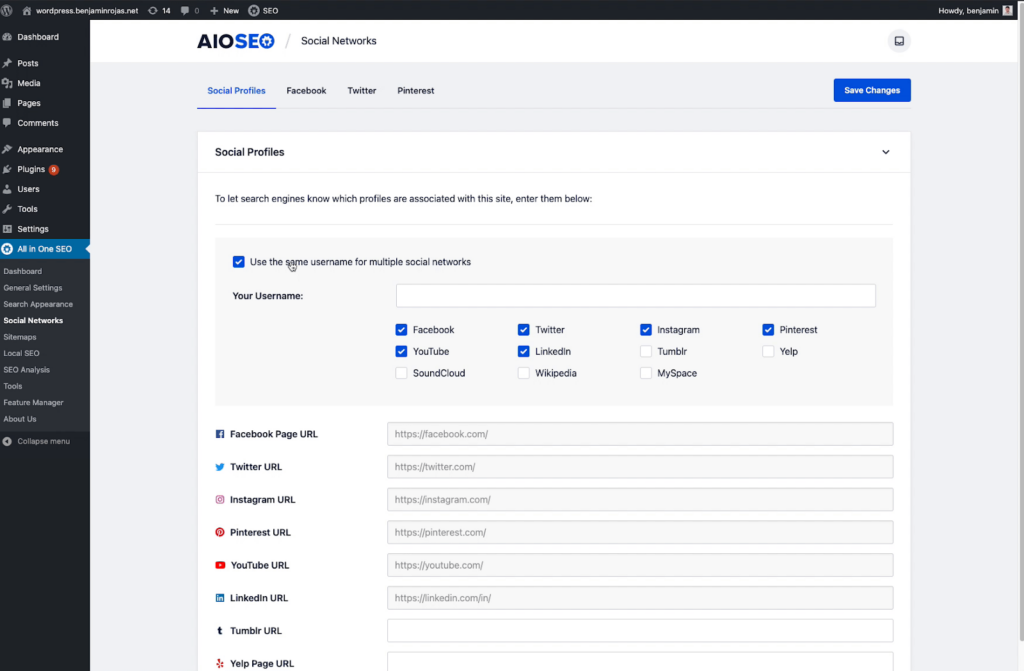
Key Takeaways:
- Shopify handles many technical SEO fundamentals automatically (sitemaps, robot.txt, etc.)
- WordPress requires plugins like AIOSEO to address technical optimization.
- Shopify has built-in on-page SEO fields for titles, meta descriptions, etc.
- WordPress gives more control over on-page elements via plugins and code editing.
- Shopify limits access to source code, restricting advanced SEO tweaks.
- WordPress allows editing at the code level for in-depth SEO customization.
- Shopify’s website structure is less SEO-friendly for large product catalogs.
- WordPress can leverage SEO-optimized site architecture with proper planning.
- Both integrate well with Google Analytics and other SEO tools.
Winner: WordPress.
While Shopify provides capable SEO features in a user-friendly interface, WordPress gives SEO professionals more levers to truly optimize every technical and on-page aspect of a website through its open architecture and rich plugin ecosystem – making it the more SEO-powerful option.
Keep Reading: WooCommerce Site Speed: Quick Tips to Speed Up Your Online Store
GDPR Compliance
There are tools to assist Shopify and WordPress’ Woocommerce site users in adhering to the requirements outlined by the General Data Protection Regulation (GDPR), which safeguards the privacy rights and data of individuals in the EU.
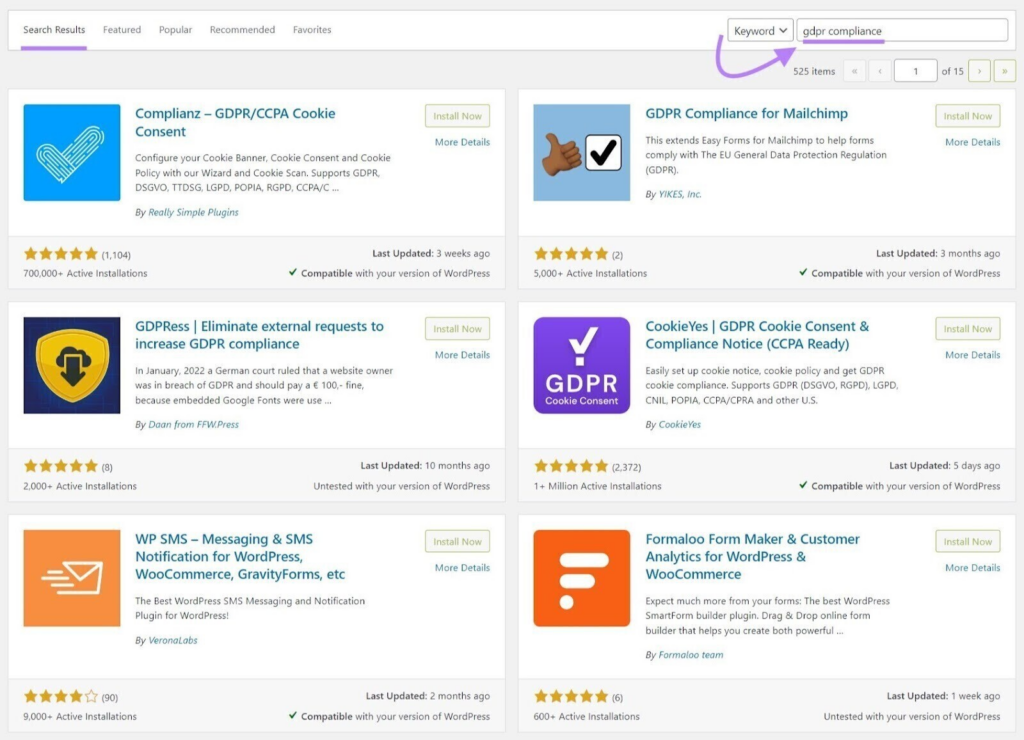
Key Takeaways:
- Both Shopify and WordPress provide features to display cookie consent banners, allowing users to opt out of data collection.
- They offer mechanisms to facilitate the deletion of user data upon request and notify users in case of data breaches.
- Shopify users can utilize the Privacy & Compliance app to enhance GDPR compliance, including features such as cookie consent banners and cookie preference banners.
- WordPress users can leverage various plugins to make their websites GDPR-compliant.
- Consulting a legal expert is advisable to ensure full compliance with privacy laws regardless of the chosen platform.
Read More: Best WordPress Website Management Services
Winner: WordPress
Because it empowers users with full control over their website’s GDPR compliance through its open-source nature, enabling integration of compliance solutions for individual needs.
Multilingual Sites
When it comes to reaching audiences worldwide, both WordPress and Shopify step up with features for creating multilingual websites. While Shopify’ is equipped to add 20+ languages, WordPress offers even broader multilingual support through its plugins and extensions.
Key Takeaways:
- WordPress offers extensive multilingual support through plugins like WooCommerce Multilingual & Multicurrency with WPML.
- Users can translate their shops into numerous languages and currencies on WordPress, catering to diverse audiences.
- WordPress allows for adding an unlimited number of languages, but adding too many may impact site performance and SEO.
- Shopify simplifies the process of adding multiple languages and currencies with the Translate & Adapt app.
- The Translate & Adapt app enables Shopify users to include up to 20 different languages and various currencies without starting from scratch.
- Both WordPress and Shopify prioritize enhancing user experience by offering region-specific language and currency options.
- These features ensure seamless navigation for visitors worldwide, improving overall user satisfaction.
Winner: WordPress.
Because it provides powerful multilingual capabilities, ensuring unrestricted access to global markets.
Read – Weglot Review: Make Your Websites Reach a Global Audience!
Mobile Apps
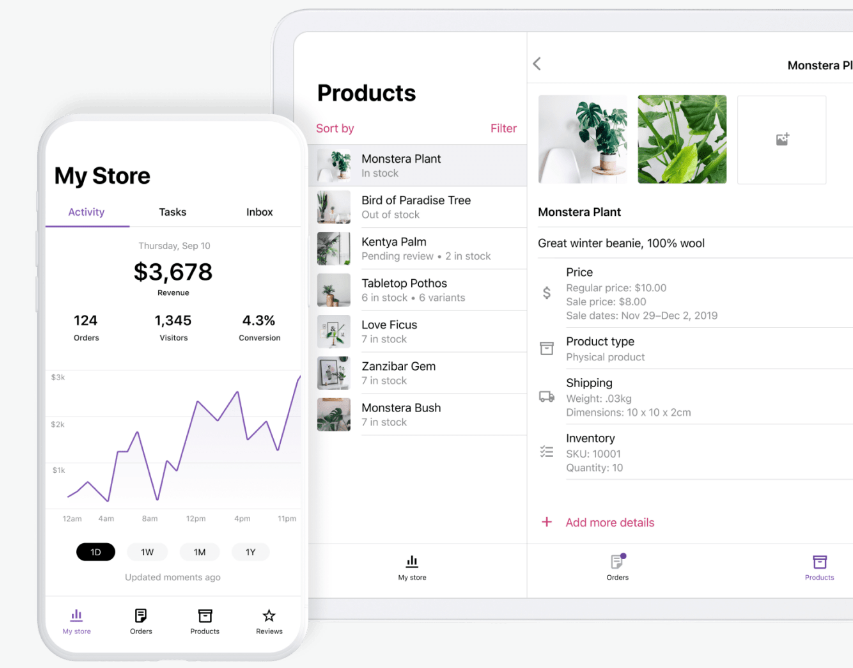
Shopify and WordPress have handy apps you can use on your phone. So, whether you’re out and about or chilling at home, managing your online store is just a tap away! While Shopify’s dedicated iOS and Android app provides comprehensive features for managing products, orders, and marketing campaigns, WordPress users can utilize the WooCommerce Mobile App for similar functionalities. Both platforms cater to mobile commerce, but Shopify requires less effort to ensure mobile-friendliness.
Key Takeaways:
- Shopify’s mobile app offers robust features for managing products, processing orders, and communicating with customers, providing a seamless mobile shopping experience.
- WordPress users can leverage the WooCommerce Mobile App to create products, manage orders, and track statistics, enhancing the mobile management of their online stores.
- Shopify emphasizes the importance of mobile commerce, with projections indicating that nearly half of e-commerce purchases will be made from mobile devices by 2024.
- To optimize mobile shopping experiences, online stores should prioritize responsive design, fast loading times, and mobile payment options.
- Shopify themes are inherently responsive, ensuring a consistent experience across different devices, while WordPress users need to verify the responsiveness of each theme individually.
- Both Shopify and WordPress websites can achieve fast loading times, although factors such as file sizes, installed apps/plugins, and chosen themes can impact site speed. Additionally, Shopify Payments offers instant access to mobile payment options like Apple Pay, while WooCommerce provide similar functionalities depending on the chosen payment gateway.
Keep Reading: Responsive Design Beyond Mobile: Crafting Experiences for All Devices
Winner: WordPress.
Because WordPress leads in mobile shopping with its WooCommerce Mobile App, providing convenient access to manage products, process orders, and track stats on the go.
Customer Support
WordPress and WooCommerce may not have as many support options as Shopify, but they still offer robust assistance to their users. While there’s no direct support chat, WordPress has a vibrant online forum where helpful volunteers answer questions. Additionally, each plugin and theme on WordPress has its own support team and forums, ensuring specialized help when needed. With WooCommerce, users can access extensive documentation and guides to troubleshoot common issues independently.
Key Takeaways:
- Shopify provides direct access to support chat, message options with callback requests, and a discussion community, ensuring quick and comprehensive assistance for users.
- WordPress, being open-source, lacks centralized support channels like live chat but offers an active online forum where community members can seek and provide assistance.
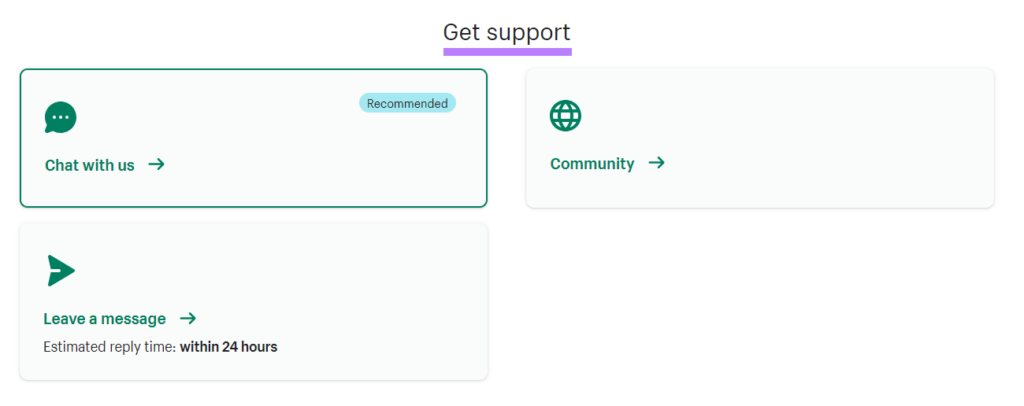
- Each WordPress plugin and theme typically has its own dedicated support team and forums, allowing users to directly reach out for assistance tailored to specific products.
- While Shopify’s support system offers a wide array of resources for various inquiries, WordPress users can still benefit from specialized support channels within the WordPress ecosystem.
- Both platforms prioritize customer support to ensure users receive timely assistance for any queries or issues they encounter during their website management journey.
Winner: Shopify.
Because Shopify offers a more extensive range of resources compared to WordPress.
Also Read: WooCommerce Vs Shopify: Who Wins?
Pricing
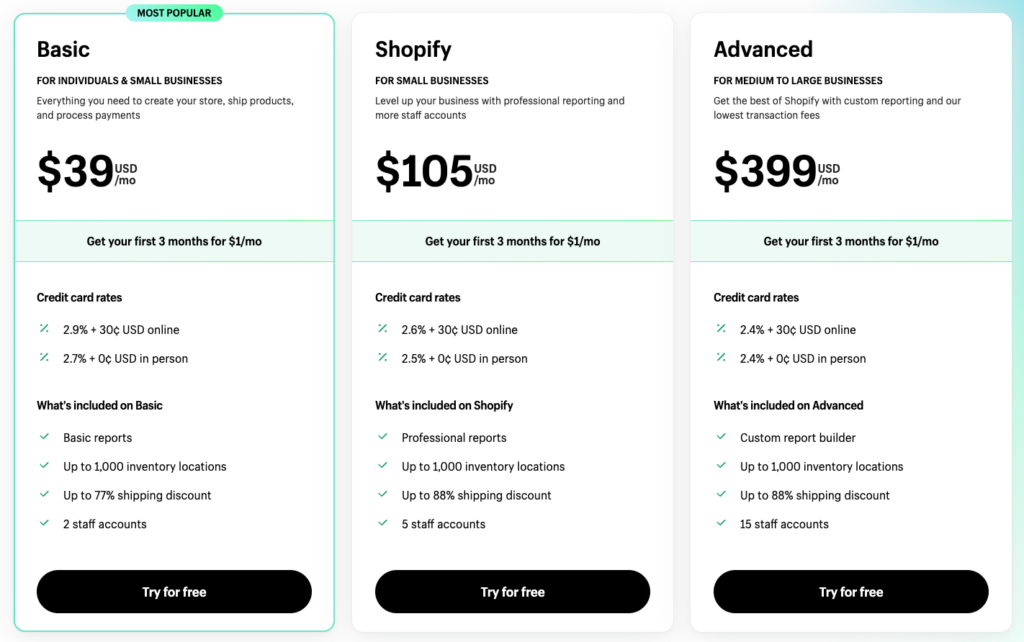
When comparing pricing between Shopify and WordPress, it’s important to consider various factors that contribute to overall costs. Shopify offers plans starting at $39 per month, providing features suitable for individuals and small businesses, along with additional expenses such as domain registration for $14.95 per year. On the other hand, WordPress itself is free to use, but users need to invest in web hosting and domain registration, which can vary in cost depending on the provider and domain type. Here’s a breakdown:
Key Takeaways:
- Shopify’s pricing starts at $39 per month for the basic plan, offering features tailored for individuals and small businesses, with additional costs for domain registration.
- WordPress is free to use, but users need to invest in web hosting and domain registration, which typically range from $10 to $20 per year.
- While Shopify provides a clear pricing structure with monthly subscription plans, WordPress offers flexibility in choosing hosting providers and domain registrars, allowing users to find cost-effective solutions based on their needs and budget.
- Both platforms offer opportunities for scalability, allowing users to upgrade their plans or invest in additional features as their businesses grow.
Winner: WordPress.
Because it offers a cost-effective solution for building and managing websites compared to the subscription-based model of Shopify.
Did You Know? – How To Migrate From Shopify to WooCommerce?
The Verdict: Which One Wins as an eCommerce Website?
The Shopify vs. WordPress decision hinges on your specific goals and growth plans. If seeking a swift launch with minimal technicalities, Shopify’s streamlined approach excels. But for ambitious customization and content-marketing integration, WordPress offers unmatched versatility. Carefully assess current and future needs, allocating resources strategically.
Embrace a growth mindset, consistently reevaluating platform capabilities. Leverage expert guidance to maximize your platform’s potential and make informed choices propelling your online venture’s sustained success. Align your selection with overarching business objectives for a thriving, resonant online presence.









